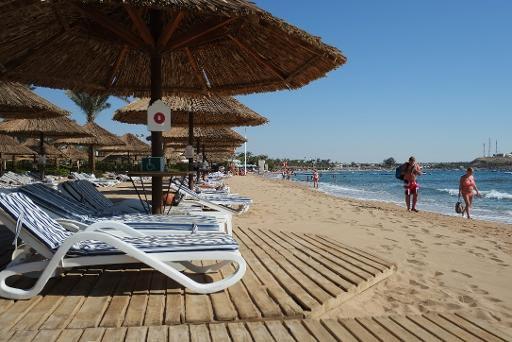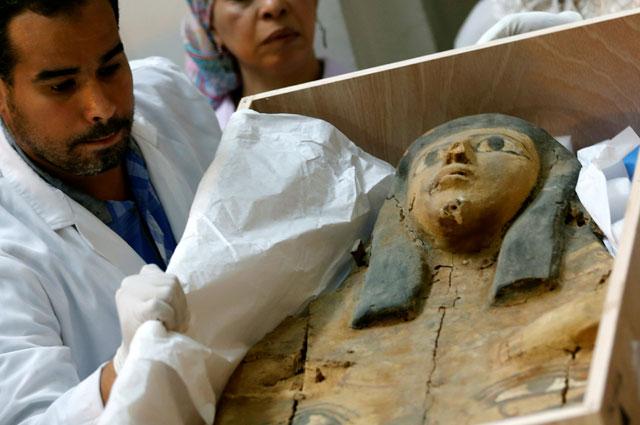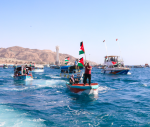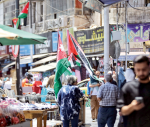You are here
Egypt dreads Sinai bus bomb impact on tourism
By Reuters - Feb 20,2014 - Last updated at Feb 20,2014

CAIRO — Egypt’s central bank said this week it would allocate 10 billion Egyptian pounds ($1.44 billion) for low-cost housing projects, one of the demands in protests that led to the ouster of autocratic President Hosni Mubarak in 2011.
Better living conditions, an end to official corruption and more democratic rights figured prominently in those protests. About half of Egypt’s 85 million people live under the poverty line, many in slums with no access to clean water or sewage.
Mubarak’s ouster drove the state into a deeper economic and political crisis. Last July, the army ousted Islamist President Mohammed Morsi, who was elected in 2012, after protests against his rule that failed to enact economic reforms.
The three-year turmoil led to a sharp fall in foreign reserves and currency value.
The central bank said its investment in low-cost housing should have a positive effect on the state’s economic growth and social development.
The money will be deposited to banks for 20 years at a low interest rate to lend it to citizens who qualify to buy houses at a yearly interest rate of 7-8 per cent. Inflation is currently running over 11 per cent.
Separately, a suicide bombing that killed three South Korean tourists in south Sinai has sent shockwaves through the resorts dotting its pristine coastline, with Egypt’s vital tourism industry in the crosshairs of militants.
The bombing of the tour bus on Sunday was claimed by an Al Qaeda-inspired group, Ansar Beit Al Maqdis, which said in a statement that the bus attack was “part of our economic war against this regime of traitors”.
The bombing threatens to hit the government’s efforts to revive the key tourism industry, which accounts for over 11 per cent of Egypt’s gross domestic product (GDP).
The jihadi group “is a threat to tourism and aims to hinder the roadmap”, Egyptian newspapers quoted Prime Minister Hazem Al Beblawi as saying.
Bus driver Fekri Habib said his company has already cancelled two tourist trips to Saint Catherine’s desert monastery, one of the south Sinai destinations that South Koreans had visited before their bus was attacked near a border crossing with Israel.
The peninsula’s southern coastline, popular among Western tourists for its animated resort towns, had been spared from the violence rocking the country. In the past three years, “south Sinai was doing well in comparison with other areas, Cairo or Luxor for instance,” tourism ministry spokeswoman Rasha Al Azayzi said.
Azayzi indicated that 75 per cent of tourists to Egypt visited the Red Sea and south Sinai shores, including the resort city of Sharm El Sheikh.
With its sunny beaches and coral reefs, south Sinai was considered a safe haven isolated from Egypt’s turmoil.
“I asked my husband how far it [Sharm El-Sheikh] was from Cairo as I was cautious not to get close to the centre,” said Suzanne Peamon, a 55-year old English tourist visiting Sharm El Sheikh.
“I did think twice about visiting Egypt, but since Sharm El Sheikh is far enough from Cairo I said okay,” she added.
But standing in the gardens of Sharm El Sheikh International hospital with the brother of the Egyptian bus driver who was also killed in the Taba blast, fellow driver Habib, 51, said he expects the attack to have a huge impact on tourism.
“Most compagnies cancelled their trips” on Monday, a day after the attack, Habib said.
‘Bye bye to tourism’
On the road linking the capital to the resort city of Sharm El Sheikh, cars are stopped at several security checkpoints, where policemen check for identification and ask for their destination.
Mohammed Hamdi, the owner of a souvenir shop in Sharm El Sheikh, remarked that it was to early to evaluate the impact.
“It will be clearer next week or in 10 days or so, when people who were expected to come cancel their trip or not,” he said.
He acknowledged, however, that a repeat of such an attack could deal a fatal blow to an already ailing tourism industry, a vital source of income for Egypt.
“If this happens in Sharm or Hurghada, you can say bye bye to tourism,” Hamdi said.
Having dinner with her husband in a seafood restaurant, 55-year-old Italian tourist Rosalina Grumo said her friends cancelled a trip after learning of the Taba attack, but that she was already in Egypt at the time.
The government’s census agency said the number of tourists plunged in December 2013 by almost 31 per cent compared with the same month of 2012.
Tourists are still sunbathing on the beaches of Sharm El Sheikh in the morning and strolling the commercial downtown in the evening, but the town looks deserted in comparison to past years.
Tareq Hamad, owner of a beachwear boutique in a fancy mall, said he did not know if he will even be able to pay the rent at the end of the month.
“I really hope it will get better ... We can’t take any more,” he said, pointing to a steady deterioration over the past six months ever since Morsi’s ouster.
Georges Colson, chairman of French travel agency federation SNAV, said his organisation was advising people to choose alternative destinations.
“The winter season is dead, and indications for Easter are that people are not fighting to go to Egypt,” he said.
Tourism revenue slumped 41 per cent last year to $5.9 billion.
In Hurghada, hundreds of kilometres south of Sinai on the Egyptian mainland, boat and beach resort manager Nasser Mazen said he was worried.
“At the moment we only work at 25 per cent capacity of what we would normally do in February,” he said. “We hope that these attacks will stop. Tourists... see what’s happening in Egypt in the media and postpone their travel to next year or later.”
France’s Club Med, which runs the Sinai Bay resort in Taba, said it was keeping the site open but had stepped up security and was advising clients not to venture outside the village alone.
The new threats in Egypt are “a situation that is a source of concern for us”, a Club Med spokeswoman said.
Some guests have cancelled trips, she said, and Club Med was offering refunds or the chance to book to other destinations.
Marriott, Hilton and Accor have also stepped up security at their hotels in Sinai.
Scaling back
Foreign governments have warned their nationals visiting Egypt’s big cities since 2011, but the sense of urgency has grown after Sunday’s attack.
The UK embassy in Egypt advised Britons on Wednesday against all but essential travel to most of southern Sinai, home of some of Egypt’s busiest resorts. That level of warning did not apply to the region’s biggest tourism zone, Sharm El Sheikh.
A French diplomatic source said: “Given the Egyptian and regional context, all travellers should consider that there is a threat of terrorism. The situation in the Sinai is worrying”.
Around 100,000 French tourists travelled to Egypt last year, already just a sixth of the number who visited in 2010.
Only days after the Taba attack, Russia’s tour operator association is reporting a fall in bookings and Germany’s travel association DRV is bracing for bad news.
“Travel from Germany has simply not recovered since the Arab Spring and any further destabilisation only makes guests more wary,” said DRV President Juergen Buechy.
About 975,000 Germans travelled to Egypt in 2013, 15 per cent down on 2012 and far below the 1.3 million who travelled there in 2010, the Egyptian tourist office in Frankfurt indicated.
Russian, Germany and Britain are Egypt’s biggest source of tourists. Tour operators such as TUI Travel and Thomas Cook have scaled back the number of Egyptian holidays on offer during the past three years.
European travel companies hit by weak local economies and the turmoil in Egypt now face more pain. The slump in Egyptian business already cut 19 million euros off TUI Travel’s operating profits in the first quarter, its parent company TUI AG said last week.
For now, tour operators are not obliged to offer free cancellations and rebookings or to bring people home early.
People already holidaying in the big Red Sea resorts of Sharm, Hurghada and Marsa Alam seemed untroubled by the latest news, tour operators and associations said.
Guests are being kept up to date with news and travel advice, but none have asked to come home early, representatives of Italian and German tour operators told Reuters.
But many have cancelled day trips to far-flung spots within Sinai such as St Catherine’s Monastery.
“We cannot prevent clients from going to Egypt but it is our role to warn them about the risk,” said Colson of France’s SNAV.
Related Articles
German tour operators started bringing hundreds of holidaymakers back from Egypt’s Sharm El Sheikh Red Sea resort on Thursday after Germany’s foreign office advised against travel to the entire Sinai peninsula.
CAIRO — Egypt’s Tourism Minister Hisham Zaazou said on Saturday that the government will announce additional security measures to safeguard
CAIRO — British Airways has extended its suspension of flights to the Egyptian resort of Sharm El Sheikh indefinitely, becoming the first ma


















